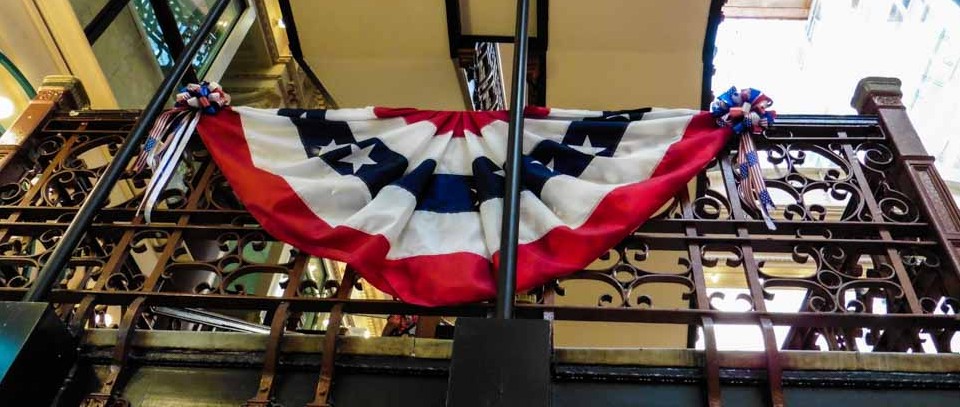7 Reasons NOT to Renounce
When I was considering renouncing US citizenship, and then, once I had decided to do so, I heard several arguments for why I shouldn’t renounce.
Reason not to renounce #1
But what if something happens where you are—an invasion or a natural disaster or something? The US would come and get you out!
Answer #1: They most likely wouldn’t. Generally what happens in such situations is that the US embassy sends out an alert telling US citizens to get out. They are left to fend for themselves, in other words, and I’ve heard plenty of stories of Americans being evacuated from a danger zone by the British or other countries rather than the US.
When the US does evacuate people, they charge them the “full coach commercial fare.” They’ll save people, but at a price, and only in the most dire circumstances. And they will only be taken to a nearby safe place, not back to the US.
In Paris, when the attacks happened in November, some American tourists headed for the US embassy. They were turned away.
Answer #2: It’s pretty unlikely, don’t you think? Yes, I know, Germany has invaded the Netherlands before. But today’s Germany won’t. The most likely natural disaster would be flooding, but the Dutch are the experts at water control, and I live in a relatively high part of the country (seven meters above sea level!).
Answer #3: My Dutch passport gives me the right to move to any country in the EU, and many outside of it too. So if worse came to worst, I’d have plenty of places I could move to. If I had a non-EU passport, Reason to Renounce #1 would be a lot more compelling.
Reason #2
But what if you want to go home?
“Home” is a term I struggle with. The fact is that the US hasn’t felt like home in many years. I love to visit there; I enjoy the strange familiarity of it: a lot of “Oh, I remember that!” But the longer I live in the Netherlands, the more of a tourist I feel like when I’m at “home.”

So would I ever move back there? I’ve thought about that a lot, since my renunciation will make it hard, or perhaps impossible, for me to live in the US again.
I can’t imagine my husband would ever agree to living in the US again, so I would only ever even consider it if something, God forbid, happened to him and I became a widow. Or he traded me in for a younger model, as they say, but that’s just not his style.
If I was suddenly alone, my first instinct, I think, would be to run home. But as I said above, it isn’t home anymore.
I’ve thought about where I would like to live in the US if I had a choice. San Francisco is my favorite American city, but I couldn’t afford it. I love Hawaii for the beautiful tropical climate, but I can get a tropical climate elsewhere. I could move to Guadeloupe and not even leave the EU!

Wherever I live, I can still visit the US on my Dutch passport. I just can’t stay too long.
Reason #3
But having a US passport makes it so much easier to enter the US.
Yes, that’s true. The lines move faster for the US citizens at passport control than for foreigners. And I would need to get a visa waiver ahead of time as well.
I only visit the US every few years. I can handle a longer line and a bit of on-line paperwork.
Reason #4
I couldn’t renounce. My parents are getting older. What if I needed to go take care of them?
This is a good reason for many to keep their US citizenship, but my parents passed away back in 1995. That’s part of what led me to move to the Netherlands in the first place. My husband wanted to go home and, once my parents died, it felt like my ties to the US got weaker. I have two sisters in the US still, but when they’re old enough to need care, I will be old too!
Reason #5
It’s nice to have two passports.
It was indeed nice. If one was expiring, I could use the other. Going to the US, I used my US passport. Pretty much everywhere else, I used my Dutch one. Is that worth all the stress that being an overseas American causes? No.
Reason #6
People are desperate for US citizenship. Look what they go through to get it, and you’re throwing it away?
Yes, that’s true. My grandparents were immigrants, and were extremely fortunate to get to the US when they did. But the situation of an immigrant to the US today has no bearing on my situation. Whether I keep or renounce my own citizenship has no effect on their efforts to attain it. And I feel just as fortunate to have Dutch citizenship as they would to have US citizenship.
Reason #7
I simply couldn’t renounce. I’m American and always will be.
This is probably the best argument I’ve heard for keeping US citizenship, and yet it’s the most irrational and emotional. My feeling of personal attachment to America was what made this decision such a struggle. That passport represents something: a sort of club membership, and it’s a very special, exclusive club that, as I said above, people are desperate to join.

Americans are taught from a very early age how special the US is. This exceptionalism is a source of pride and a glue that binds the whole population together. The desperation of immigrants trying to enter the US only confirms that feeling. Look at the President’s words in the State of the Union Address:
Our unique strengths as a nation — our optimism and work ethic, our spirit of discovery, our diversity, our commitment to rule of law — these things give us everything we need to ensure prosperity and security for generations to come.
and
That’s the country we love. Clear-eyed, big-hearted, undaunted by challenge, optimistic that unarmed truth and unconditional love will have the final word. That’s what makes me so hopeful about our future.
Americans take this sort of statement for granted; they accept as a given that America is exceptional, which carries the implication that it is better than other countries. It is not until we leave the country and live elsewhere that we see that many other places are very special too.
So is having citizenship what makes people American? I would argue that I remain an American. I self-identify as American. Others refer to me as American. People don’t normally see my passport, except at border control booths in airports. In other words, I have to actively define myself as Dutch if I want to be seen as Dutch. Otherwise, I’m an American still, and always will be.
You know how the story ends: I renounced, despite all these reasons I heard. None of them was enough to dissuade me. What about you? Have you renounced or are you considering renunciation? Add a comment below.
My whole US citizenship series:
- Part 1: Giving up US citizenship?
- Part 2: Republicans, expatriates, and FATCA
- Part 3: How my citizenship hit me in the gut
- Part 4: My renunciation day
- Part 5: Thanksgiving reconsidered
- Part 6: FATCA, the Tea Party, and me
- Part 7: Individual freedom, self-reliance and renunciation
- Part 8: Equality? Competition? Not overseas!
- Part 9: The American Dream
- Part 10: The irony of renouncing under duress
- Part 11: Open letter to President Obama in response to the State of the Union Address
- Part 12: 7 Reasons NOT to renounce
- Part 13: Citizenship matters
- Part 14: Citizen of a parallel world
- Part 15: Renunciations in the news
- Part 16: Vote … as a non-citizen? Really?
- Part 17: The ridiculous story of a pilot and his taxes
- Part 18: On receiving my Certificate of Loss of Nationality
- Part 19: So you think you want to emigrate…
- Part 20: Indignation Fatigue and FATCA
- Part 21: The US election, as seen by Americans overseas
- Part 22: On receiving my California voter ballot
- Part 23: Watching America fall apart on my renunciation anniversary



All valid points. I feel too American to renounce. Despite the British passport I also hold, in my heart I don’t feel anything other than American.
I know a lot of people who feel the same way!
Great post. I’ve been struggling with renouncing for a while. I always said “the US is my home”. A few months ago, I realized: we call places home because they feel safe, and we feel comfortable and welcome. The US passport does not make me feel any of those things. I am currently in the process of renouncing.
Yes, home is a feeling much more than a place. If it stops being home, except maybe for nostalgic reasons, then the decision becomes much more about practicalities.
“I simply couldn’t renounce. I’m American and always will be.”
I had a hard time dealing with this myself but quickly came to conclusion that I was only renouncing a piece of paper in my pocket, not the blood in my veins. So I went through with it and am glad to have done so.
My only regret is not having renounced sooner.
It took me a bit of soul searching before I reached the same conclusion. I wish I had renounced before the fee went up so much!
Wow! 7m above sea level! When did the Netherlands become part of Switzerland?
And btw- I consider being a San Franciscan to be as close to renunciation as one can get without actually moving.
Good point!
Haha!
I don’t feel American….. Was there for 45 years, then the UK for 15… Patriotism is such a silly thing and Americans are brainwashed about it…… The more I travel the more the realisation EVERY every country has its fabulous points…..
I think you’re probably right, except for war zones…
Sooner or later there will be a repeal of US citizen-based taxation and I predict there will be an open invitation for those who renounced to reapply for US citizenship. Remember that borders are man-made devices and there are not fixed forever.
I hope you’re right! And that they won’t charge me again!
In the final analysis, you have to be true to yourself and to your family. If renunciation takes you closer to that goal, then it’s the only thing to do.
All of the good reasons for renouncing you mentioned ring true for many of us.
And most of the reasons we prudently refrain from mentioning apply as well.
To me, it’s good to know that other expats are following the same line of reasoning as I did in this matter.
And it’s great to see that so many of us have found a better home than the one we left.
I’m curious what you mean by “most of the reasons we prudently refrain from mentioning” …
Please Rachel, you don’t need much of an imagination to figure it out.
Well, I guess I don’t have much of an imagination then. He could mean tax issues, since on paper at least you’re not allowed to renounce to avoid taxes, so people who are renouncing tend to avoid any mention of taxes – though I’d argue that the vast majority of us don’t do it to avoid taxes but to avoid accountants’ fees year after year. He could also mean politics, and a general desire to leave the US because of the endless political craziness. What does your imagination tell you he means?
All good points. I think the only real reason people would hang on to it is Emotion and it takes a lot to counter that, although after reading your previous posts I think I would renounce if I lived overseas as you do.
Yes, and I’ve always distrusted emotion or intuition as ways to make a decision, yet in this situation it’s important not to ignore them.
The main point is, “patriotism” is now actually “nostalgia, wrapped in a flag”.
Unfortunately, the USA that people “believe” that they live in is long-gone– & has been since the Reagan era…
The bought-for “press” (now “spinners” for the couple of uber-wealthy, right-wingers who own the media) keep the ruse going– manipulating the emotions of the populace, to keep it all going. But what you, Rachel, & I & others of our generation knew as “our country”, is all but gone now. Sad but true. I’m both sad for it’s demise, yet glad to be away from it.
Sanders is the USA’s, “Obi Wan”. If Clinton or (shudders) a GOP gets into the WH, the slippery-slope will become an Olympic downhill slalom.
Your statement that patriotism is “nostalgia, wrapped in a flag” is interesting to me. It implies that what people are patriotic about doesn’t exist anymore, or perhaps never did. And I agree with much of what you say following that, but I’m not sure I agree with that first statement. If it was just nostalgia for what people our age remember (or think we do), then young people wouldn’t feel patriotic anymore, would they? Nostalgic for something they’ve heard once existed, yes, but not patriotic about America as it is today. And people of all ages in the US feel patriotic still, I think. I’d also add that America wasn’t so great in the past either or the Civil Rights movement wouldn’t have been necessary, or the Cold War or Vietnam, etc. etc. etc. even before Reagan. I am, like you, feeling increasingly glad to be away from it, though tinged with sadness.
Rachel, what you & I knew as the USA is gone- long gone, & I’m sorry.
The idea that “young people” are buying into the lie doesn’t change a thing. A lie is a lie: manufacturing shifted overseas (polluting there) is a fact, US corps are “people” (though never come home in body-bags), top 1% pay little or no tax yet put into the economy nothing, tax laws require low-income to pay, & it just keeps going….the only ones who make out good are slick tax acct.’s & their clients.
Really. It’s a sick joke. Please tell me you know this.
I agree that all those things are happening. I had a similar conversation with a friend the other day and her point made some sense to me: even with so much that is going bad, you don’t see people fleeing the country (leaving, sometimes, but not fleeing) and you do see lots more people wanting to immigrate TO the US. In other words, despite all of these negative points that you list (and more!), something is still good about the place, good enough for people to feel patriotic and for people to want to move there. I can’t see that as only a matter of buying into propaganda. Certainly the patriotic messages everyone is brought up with there affect their thinking, but that doesn’t explain the sheer number of immigrants who want to live there and become citizens. Or perhaps it’s all just a matter of the situation being bad, but it being worse in many other places … I don’t know, but I guess I’m just not feeling like it’s all over.
“you do see lots more people wanting to immigrate TO the US. In other words, despite all of these negative points that you list (and more!), something is still good about the place, good enough for people to feel patriotic and for people to want to move there.”
Imho, the people migrating in are a) already independently wealthy or well-off, b) coming from a much worse place, or c) are buying the lie that the USA is one, big Hollywood Patriotic movie where all you have to do is to “work hard” & presto- you’re a millionaire! What you don’t hear about from the paid-for-by-the-Mudochs-of-the-world-media is that most ARE working hard– very, very hard, at substandard wages, with no benefits, no health care, and not only are they NOT getting ahead, they’re actually going backwards. I know quite a few people who tried to live in the USA but returned when the hype wore off. The best thing about the USA is that many people there are genuinely good, but nice people can’t compensate for the rest of it…
At this point, the USA has set itself up as a terrorist nation– against it’s own diaspora as well as all the other countries using it’s US dollar as a weapon via Bretton Woods. China isn’t far away from it’s currency being a better choice– with no strings attached. I think that day is near.
With respect to your saying:
“At this point, the USA has set itself up as a terrorist nation– against it’s own diaspora as well as all the other countries using it’s US dollar as a weapon via Bretton Woods.”
If you haven’t done this already, google, “weaponization of finance” and read the writings of Ian Bremmer.
FATCA is of course a gross violation of the “sacred trust” granted to the USA at Bretton Woods. At that time the U.S. dollar became the primary reserve currency. Without that status, FATCA would not be possible.
I’ll have a look at your suggestions, John. You reminded me of a story I read a little while back which also points to the USA attempting to over-power all other nations in rather insidious ways:
http://sputniknews.com/us/20151008/1028223233/us-lawfare-julian-assange.html
My mother is Dutch (from Haaksbergen nar Enschede) and my father is american. Our american family comes from Ireland and Norway. Born in USA in 1965, I’ve been living in France since 1973. My parents met in France in the early 60ties.
So no, I don’t really feel american, I feel like a northern European and have no wish to go back to USA, what for ??? I don’t even have an american SSN number.
I called ACA in Paris about FATCA and they gave me the following answer in consideration of my situation.
Ask for franch nationality, don’t renew your passport and never go back to the USA…
And that’s exactly what I’m doing.
I wrote a post in 2011 which was not so much about renouncing but about the pros and cons of becoming a citizen of another country. I think I will repost on my blog but here’s the original post:http://thefranco-americanflophouse.blogspot.be/2011/06/pledging-allegiance-path-to-citizenship_05.html
The most compelling reason for me NOT to renounce is family back in the US. I went back to visit for Christmas and found out that my mother nearly died and had been rushed to the hospital just a few days prior to my arrival. I’m very concerned that I would not be able to get on a plane fast and head back to the US to be with my mom if she has another medical emergency or needs care.
I had a private message from one of my readers about his.her reasons not to renounce and interestingly enough it was all about the spouse. The spouse did not this person to renounce because that would mean no longer being able to live or work in the US. Though the spouse was aware of the tax issues that did not trump the benefit of being able to move one day to the US. My sposue has said something very similar to that and I have to wonder how prevalent it is.
Interesting post! The argument I’ve heard most is the same one you give: family in the US. My spouse officially returned his green card 18 years ago when we moved to the Netherlands from the US. He never wants to live there again!
I’ve appreciated reading your ruminations over the last couple of months. I too an an overseas American who is very close to renouncing. The main reason I haven’t yet is because I’m waiting for Permanent Residency( I already have another passport as I was born a dual citizen) in my current country of residence. I’ll get that in a few months and then I’ll start the interview process. I have had very similar thoughts and no one to really share them with because nobody really understands the situation until they are put in it. So thanks for putting your story out there for others who face this “problem”.
You’re quite welcome! Glad I could help.
Very interesting analysis, thanks. There’s one reason you didn’t add to the list, however, which is one that dissuades me more than the others…the cost and hassle to renounce! As you know yourself, it’s not negligible. It would take several more years of paying accountants for my filings to offset that cost, not including my time and effort to go through the process.
True. You have to weigh up the hassle and cost of renouncing against the hassle and cost of filing taxes each year plus, depending on what country you live in, the hassle and cost of things like banking limitations, double taxation of pension, etc. For me it was worth it to go through the hassle and cost of renouncing.
what do they ask in the interview? what are valid/accepted reasons to renounce.
It’s not really an interview. You don’t even have to give a reason for renouncing, but you can hand in a statement if you want. The main thing they want to know is that you are not being coerced and that you understand that renunciation is irrevocable. See my article about my renunciation day here: https://rachelsruminations.com/renunciation-day/
Thank you for your thoughts. I am seriously debating with myself about renouncing, this is not an easy thing to do. So I appreciate your article. All the questions and emotions are endless.
I know what you mean. Writing that series of posts helped me sort through it all. Good luck, whatever you choose to do.
Interesting site. Thanks. Also, “Why america FAILED”, by Morris Berman explains a great deal why many are escaping the us empire and why the us was nothing more than hustlers and hucksters all trying to get rich.
If I can manage to leave it will be because I don’t want to be a part of the Empire. It seems like I’m living on the Deathstar or Star Killer base. Maybe I’m crazy, but I don’t mind
I am seriously considering renouncing my citizenship, but I want to finish college first and make myself more appealing to other nations. I’m a double major in computer network technology and information security at a community college
Do you have another citizenship? You’d need to have another citizenship or you’d end up stateless!
I don’t have another citizenship. Indeed, I’d end up stateless, but I still ought to be able to avail myself of protection in another State?
I thought it is “I’d need to have another citizenship unless it’d be inconsistent with the Universal Declaration of the Human Rights” rather than just “I’d need to have another citizenship”? But the only thing I can find on this now, is Article 7(1)(b) of the 1961 Convention on the Reduction of Statelessness. I’m sure Article 7(1)(b) of the 1961 Convention on the Reduction of Statelessness which is the “inconsistent with the Universal Declaration of Human Rights” exception to the “You’d need to have another citizenship” is written down and mentioned in the convention for a reason.
I’m sorry, I’m not following. In my view it’s a practical question more than anything else – if you’re stateless, no particular government is required to help you in case of calamity or war. Perhaps the Declaration you cite would mean they do have to help you, but in the middle of calamity or war would you be able to get anyone to listen to that argument? And in any case, if you’re stateless, you wouldn’t be able to travel out of your country at all.
Another reason I’ve thought of for not renouncing is that I feel morally obliged to keep it. America is a huge influence in terms of foreign policy and the global stage, and I feel like, if I’ve been given this privilege to vote and therefore have even a small voice and impact on how one of the most influential countries plays its diplomacy, is a huge privilege and responsibility and obligation to take part. I haven’t left the US yet; I’d even consider moving to a ‘swing state’ long enough to be registered to vote there, before leaving, so that I could have even more of an impact than a state that I know will just lean one way.
Yes, I wish I’d thought of that beforehand. I last lived in California, so I had to vote there. Since I’m solidly Democrat (or, rather, I was, when I was a citizen), my vote had no influence. California always votes Democrat in presidential elections.
I have just sent in my paperwork – just took the first step to a very emotional decision. I, like you, will continue to self-identify as American. It’s in my blood, it’s part of who I am. I’m a little worried about getting emotional at the embassy interview. Any tips? 🙂
I did get emotional, so I don’t have any tips! I don’t think the people working there were particularly surprised when I burst into tears. But when I had pulled myself together, they just wanted to know if I was really sure I wanted to do this. They’re supposed to check that you’re not being coerced into it. Since I had written down my reasons, they could see that I had thought it all out. Good luck!
Just wondering if anyone reports difficulty vacationing in the US after renunciation. I would only have a Canadian passport that shows the US as birthplace. A friend told me her mother had trouble crossing the border as she didn’t have a US passport while her Canadian one showed an American birthplace.
I haven’t had trouble so far. What most people do is carry their Certificate of Loss of Nationality with them, just in case.